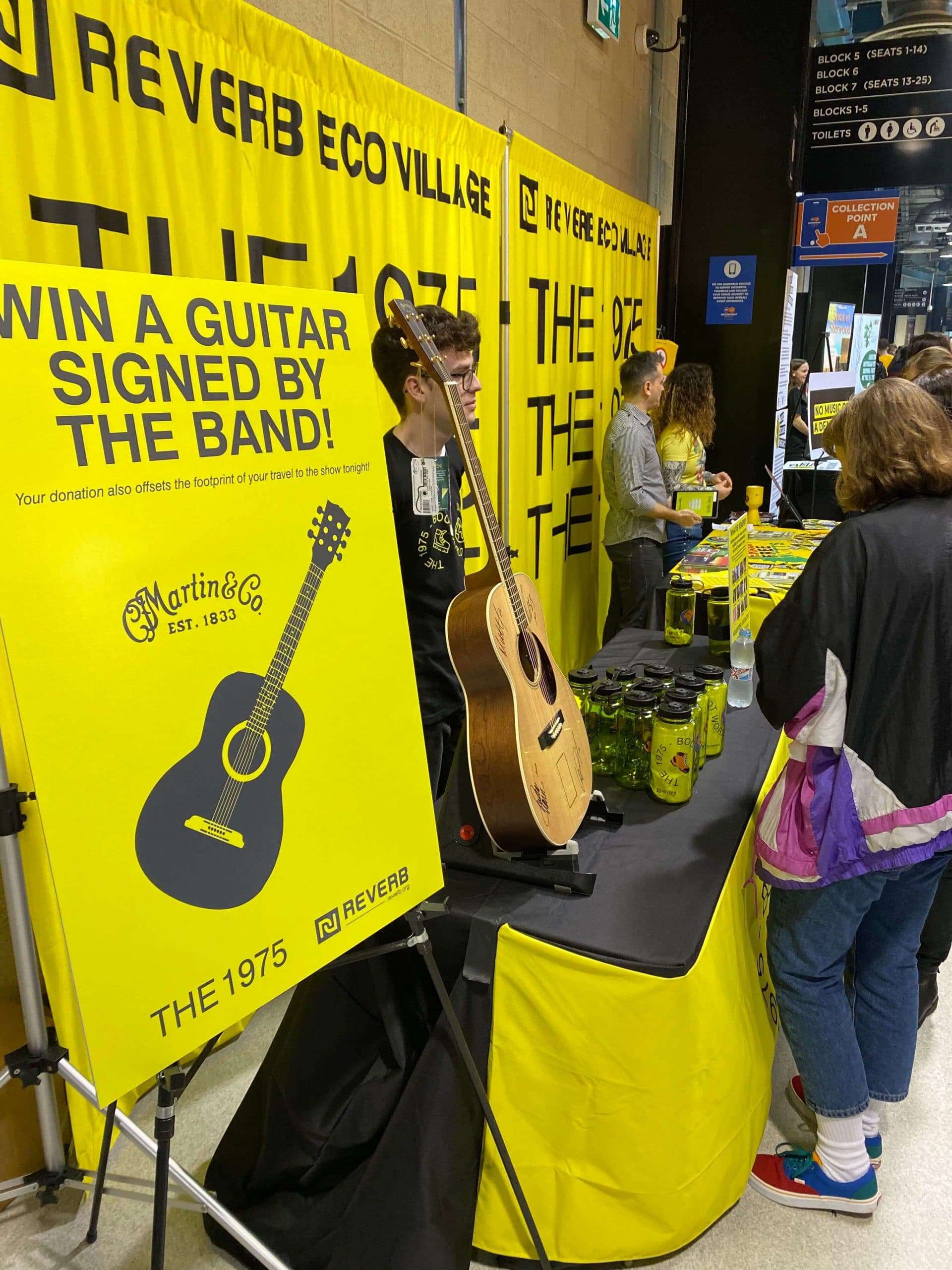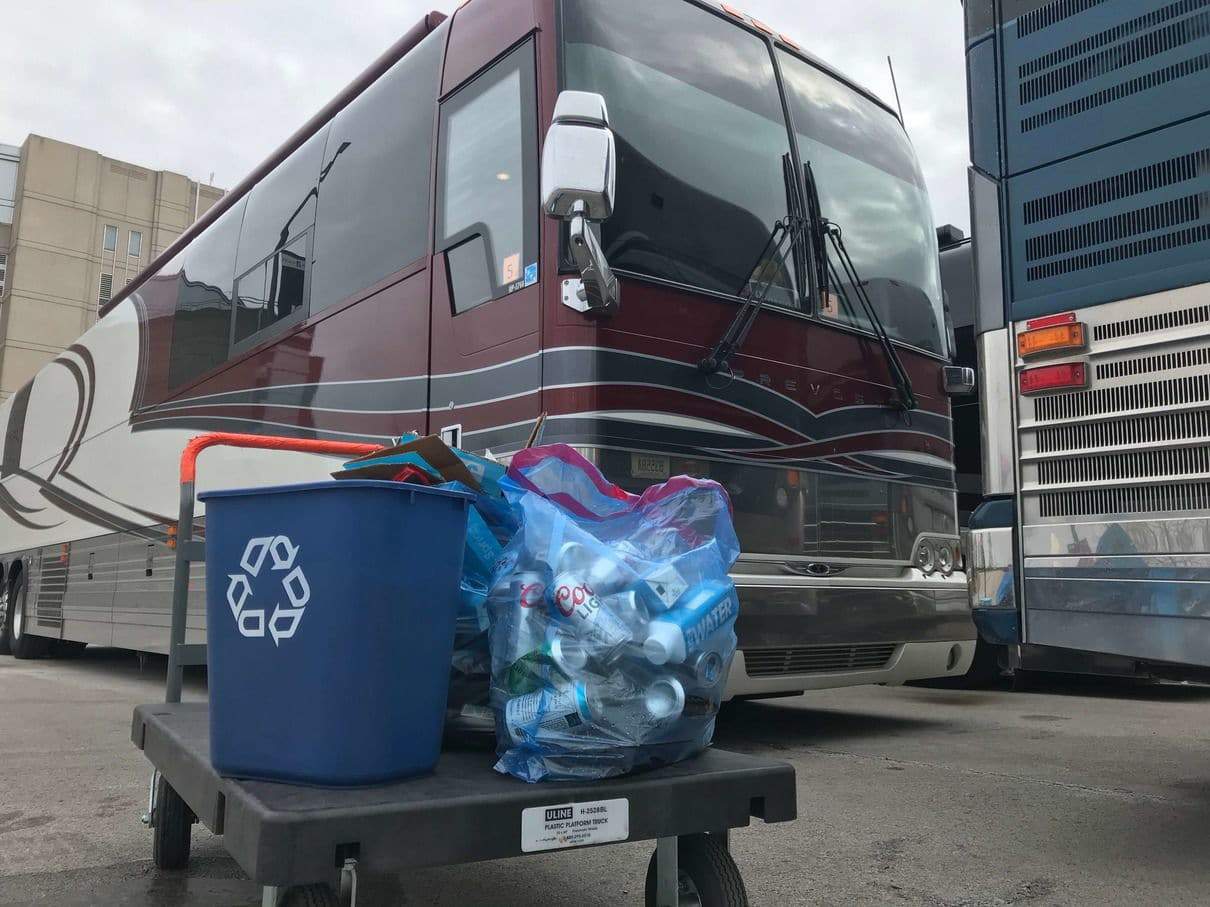Greenhouse Pioneer: Lara Seaver, REVERB

Ask a music fan what they’re most looking forward to as we emerge from the pandemic, and it’s likely that live music will be high on their list. For over a year, concertgoers have been denied the rush of hearing their favourite artists perform live, and soaking up the electric atmosphere of a live show. As a non-profit dedicated to helping musicians reduce the environmental impact of their tours, live music is REVERB’s bread and butter. The organisation was founded in 2004, by environmentalist Lauren Sullivan and her musician husband, Adam Gardner. As the guitarist in the band Guster, touring was a significant part of Adam’s life, and he was increasingly bothered by the not-so-eco-friendly nature of tour life. He and Lauren and their peers in the music world began devising ways to reduce the environmental impact of touring. Thus, REVERB was born.
The organisation now helps major artists including Billie Eilish, Harry Styles, Tame Impala and Maroon 5 organise their tours in a way that has the smallest possible impact on the environment. Not only do REVERB advise artists on how they can reduce the carbon footprint of their tours, their work also extends to reducing plastic waste at concerts, connecting tour chefs and caterers with local farmers and artisans, and galvanising fans to pledge to take action on climate and social justice through recruiting volunteers to run an Eco-Village at every tour date.
Lara Seaver is Director of Projects at REVERB. Prior to the pandemic, her role consisted of translating the goals of an artist at the pitch process into an actionable roadmap for a tour. In her words, “it was dreaming and scheming, and then making that into reality. How do you translate the goal that you have to being on the road? And then what are the logistics of that?”
A significant part of this process involves finding a way to engage fans in issues that may not naturally align with the euphoric spirit of a live music show. “Take [for example] an artist who wants to save rhinoceroses. How do you communicate that at a concert, and engage fans in a way that’s meaningful and makes a difference, but also isn’t too stodgy or upsetting? We’re trying to take that energy they have coming into the live show, and use it for good, but not necessarily make them hit a brick wall of sad reality.” Instead, REVERB’s strategy is to create an atmosphere of positivity and opportunity around the issues they educate fans on.
“We believe that everyone doing a little bit is so much more important than some of us doing everything. So [it’s about] meeting people where they’re at, teaching them one or two little things they can do, or giving them the opportunity to do those at the concert, and connecting it with the positive energy of live music.”
For the past year, live music has been scarce – and positive energy has been harder to cultivate. Lara was this side of the Atlantic supporting the 1975’s UK and Ireland tour when the COVID-19 pandemic began to gain momentum. When we talk, it happens to be the day after the one-year anniversary of the last show she worked. Prior to the pandemic, the REVERB team were gearing up for their biggest year yet, set to support close to 30 tours across multiple continents. A year on, how is Lara feeling about the work that REVERB – an organisation whose lifeblood is live music – has accomplished in a world without concerts?
“There’s a lot that we weren’t necessarily able to do while we were very focused on what city we were in tomorrow, and who was releasing tour dates,” she explains of the time pre-pandemic when REVERB were busier than ever.
“We’ve really tried to make the most of the pause… [and focus on] things that were getting pushed aside repeatedly because of the momentum we had, which was great – but this is also good.”
As is the case for so many of us, REVERB has largely migrated online in order to continue their engagement and activism. Pandemic projects include the Quarantine Kitchen series, in which musicians confined to their homes are interviewed whilst they master a new recipe.
“We didn’t necessarily want another person with their guitar on their webcam, playing few songs,” explains Lara. “That was being done well, and done ubiquitously.” Instead, artists from KT Tunstall to Jeremiah Fraites of The Lumineers, were invited to talk about their music careers whilst cooking up a storm. “Most musicians I know had never spent this much time in one place,” adds Lara, “and as many of us did, they took to the kitchen and learned how to make sourdough.” Having artists cook a dish on camera and talk about being a musician in the pandemic as they did so, was a novel way of engaging REVERB’s audience when live shows were out of the question.
The REVERB team have also had the chance to consider the bigger picture in lockdown. Adept at helping individual artists make the biggest impact possible with their tours, the team have used this year to turn their focus to uniting voices in the industry. “We’ve worked very closely with each artist in their own siloed situation, so bringing everyone together with one voice to fight the climate crisis is a priority [now].”

REVERB’s Eco-Village at The 1975’s show in Nottingham (February 2020)
Does Lara feel there’s a general shift towards more eco-conscious practices within the industry? “I think it’s going that way, because the younger generations are painfully aware [of the climate crisis]. I have four daughters, the oldest of which is in high school, and she’s very aware that the climate crisis is hers to deal with.” This trend, Lara says, is reflected in the wave of younger artists speaking out on climate change. “Billie Eilish, one of our huge artists, is really taking a stand. She has created music about the climate, and used her Grammy Awards acceptance speech to mention climate change – all of these things are really inspiring for us. I think as the generations move forward, there’s no denying that trend.” Lara acknowledges, however, that not everyone in the industry is as switched on about the climate crisis as Eilish and her cohort. “The music industry is large. Some segments are less receptive than others.”
With this in mind, part of REVERB’s strategy is to work not only with artists but with live music venues, in order to ensure that tours are encouraged to be more climate-friendly across the board. “We’re working directly with the concert promoters and venue owners – the Live Nations and AEGs of the world – to try to put expectations and policies in place across the board, since we can’t be on every tour.”
With a vaccine rollout in full flow across the USA, the REVERB team are looking ahead to a time when artists can tour again – but there’s still no shortage of uncertainty. “We’re really proud of the way we’ve been able to handle the complete pause in live music, and to be able to continue to do important activism, but we’re not out of the woods yet.” However, the pause has given Lara and the team a chance to consider how far they’ve come since REVERB’s inception. “We’ve built these really strong programmes and systems over the last decade and more, that we’re able to now expand as the realisation of the climate crisis upon us comes to the forefront.”
It’s REVERB’s hope that these systems can be put into practice again as soon as possible when tours return. But with artists and crews having lost out on over a year of touring revenue, they recognise that the landscape looks a bit different than it did last March. “We have the challenge,” says Lara, “of trying to remain as nimble and relevant as we can to fit into this new world.”
To find out more about REVERB, visit reverb.org. You can also find them on Instagram and Twitter.
Quick Q&A
Can you recommend a life-changing book for our readers?
I keep coming back to When Things Fall Apart by Pema Chödrön. There isn’t another book in my life where I can just pick it up and maybe flip two thirds of the way through and find a passage to read and think on. When I first found it, it really galvanised my own meditation practice. And especially during these pandemic times when we’re all fighting a battle of some sort or another – sometimes seven at once – it’s been a really nice, calm place to come back to.
What’s the best advice you’ve ever been given?
The best mentoring I’ve ever had has been based on trust. I think the ability to trust the people you’re working with – both the leaders above you and the people that might be executing the projects that you’ve designed or worked on – is key.
Who inspires you most and why?
My kids. I have four daughters [aged between 15 and 1]. They all bring such unique perspectives and energy to every problem or challenge we face. They’re the best travelling partners. They’re the best eyes with which to view the world, and great intrinsic motivation to keep going and making things better.

Read more of our Pioneer blogs:


